- Home
- Paulo Coelho
Brida Page 15
Brida Read online
Page 15
More people arrived, and Brida couldn’t tell who were the guests and who were the participants. Half an hour later, when almost a hundred people were gathered in the clearing, talking quietly, Wicca called for silence.
“This is a ceremony,” she said, “but it is also a celebration. And no celebration can begin without everyone filling their glass.”
She opened her bottle of wine and filled the glass of the person next to her. The wine was soon flowing freely, and the voices grew louder. Brida didn’t want to drink. Still fresh in her memory was a field of wheat in which a man had shown her the secret temples of the Tradition of the Moon. Besides, the guest she was expecting had still not arrived.
Lorens, on the other hand, was starting to feel much more relaxed and had started chatting to the people around him.
“It really is a party!” he said to Brida, smiling. He had come there expecting something extraordinary, but it turned out it was just a party, and much more fun than the parties held by his fellow scientists.
A little way off stood a man with a white beard, whom he recognized as a professor from the university. He didn’t know quite what to do, but, after a while, the professor recognized him, too, and raised his glass in greeting.
Lorens felt relieved. Witches were no longer hunted, nor were their sympathizers.
“It’s like a picnic,” Brida heard someone say. Yes, it was like a picnic, and that made her feel rather irritated. She had expected something more ritualistic, more like the Sabbaths that had inspired Goya, Saint-Saëns, and Picasso. She picked up the bottle beside her and began to drink.
A party. Crossing the bridge between the visible and the invisible by means of a party. Brida was intrigued to know how anything sacred could possibly happen in such a secular atmosphere.
Night was falling fast, and people continued to drink. Just as darkness threatened to submerge everything, some of the men present—without performing any specific ritual—lit the fire. That is how it had been in the past. Before fire became a powerful element in the rituals of witchcraft, it had been merely a source of light. A light around which women gathered to talk about their men, their magical experiences, their encounters with incubi and succubi, the much-feared sexual demons of the Middle Ages. That is how it had been in the past—a party, a huge popular festival, a joyful celebration of spring and hope, in an age when being happy was a challenge to the Law, because no one could enjoy themselves in a world made only to tempt the weak. The lords of the land, shut up in their dark castles, gazed out at the fires in the forests and felt as if they’d been robbed—those peasants were eager for happiness, and no one who has experienced happiness can ever again feel at ease with sadness. The peasants might then expect to be happy year-round, and that would threaten the whole political and religious system.
Four or five people, who were already slightly tipsy, began dancing round the fire, perhaps in imitation of a witches’ Sabbath. Among the dancers Brida saw an Initiate whom she’d met when Wicca commemorated the martyrdom of the sisters. She was shocked. She had assumed followers of the Tradition of the Moon would behave in a way more in keeping with that sacred place. She remembered the night she had spent with the Magus, and how drink had hindered communication between them during their astral travel.
“My friends will be green with envy,” she heard someone say. “They’ll never believe I was here.”
That was too much. She needed to get a little distance, to understand properly what was going on, and to resist a strong desire simply to leave and go home before she became entirely disillusioned with everything she’d believed in for nearly a year now. She looked for Wicca, and saw her talking and laughing with some of the guests. The number of people dancing round the fire was growing larger all the time; some were clapping and singing, accompanied by others keeping time by beating on the empty bottles with sticks or keys.
“I need to go for a walk,” she told Lorens.
A group of people had gathered round him, fascinated by what he was telling them about ancient stars and the miracles of modern physics. However, he immediately stopped talking and asked:
“Would you like me to come with you?”
“No, I’d rather be alone.”
She left the group and headed off into the forest. The voices were growing ever louder and more raucous, and everything—the drunkenness, the comments, the people playing at being witches and wizards around the fire—became mixed up in her head. She had waited so long for this night, but it was turning out to be just another party, like one of those charity dos, where people eat, get drunk, tell jokes, and then make speeches about the need to help the Indians in the Southern Hemisphere or the seals at the North Pole.
She began walking through the forest, always keeping within sight of the fire. She walked along a path that gave her a view from above the central stone. However, seen from high up, the view was even more disappointing: Wicca was busy circulating among the different groups, asking if everything was all right; people were dancing around the fire; a few couples were already exchanging their first drunken kisses. Lorens was talking animatedly to two men, perhaps about things that would have been fine in the setting of a bar, but not at a celebration like this. A latecomer entered the wood, a stranger attracted by the noise, in search of a little fun.
She recognized his way of walking.
The Magus.
Startled, Brida began running back down the path. She wanted to reach him before he got to the party. She needed him to help her, as he had before. She needed to understand the meaning of what was going on there.
Wicca certainly knows how to organize a Sabbath,” thought the Magus as he approached. He could see and feel the free flow of energy among the people present. At this phase of the ritual, the Sabbath resembled any other party; it was important to ensure that all the guests were on the same wavelength. At his first Sabbath, he had felt very shocked by all this. He remembered calling his Teacher over and asking him what was going on.
“Haven’t you ever been to a party before?” his Teacher had asked, annoyed at the Magus for interrupting an interesting conversation.
Of course he had, the Magus said.
“And what makes for a good party?”
“Everyone enjoying themselves.”
“Men have been holding parties since the days when they lived in caves,” said his Teacher. “They’re the first group rituals we know of, and the Tradition of the Sun took it upon itself to keep that ritual alive. A good party cleanses the minds of all those taking part, but it’s very difficult to make that happen; it only takes a few people to spoil the general mood. Those people think they’re more important than the others; they’re hard to please; they think they’re wasting their time because they can’t make contact with anyone else. And they usually end up the victims of a mysterious form of poetic justice: they tend to leave weighed down by the astral larvae given off by those people who have managed to bond with others. Remember, the first road to God is prayer, the second is joy.”
Many years had passed since that conversation with his Teacher. The Magus had taken part in many Sabbaths since then, and he knew that this was a very skillfully arranged example; the collective energy level was growing all the time.
He looked for Brida. There were a lot of people there, and he wasn’t used to crowds. He knew that he needed to partake of that collective energy, and he was quite prepared to do so, but first he needed to reaccustom himself. She could help him. He would feel more at ease once he had found her.
He was a Magus. He knew about the point of light. All he needed was to alter his state of consciousness and the point of light would appear in the midst of all those people. For years, he had searched for that light, and now it was there only yards away from him.
The Magus altered his state of consciousness. He looked again at the people gathered there, this time with a changed perception, and he could see a vast range of different-colored auras, all of them, though, were shifting
closer to the color that would predominate that night.
“Wicca really is an excellent Teacher,” he thought again. “She works very fast.” Soon all the auras, the energy vibrations that surround each physical body, would be vibrating as one. And then the second part of the ritual could begin.
He looked to left and right and finally located the point of light. He decided to surprise her and approached without a sound.
“Brida,” he said.
His Soul Mate turned around.
“She’s gone for a walk,” a young man said politely.
For a moment that seemed to last forever, the Magus looked at the man standing before him.
“You must be the Magus that Brida has told me so much about,” said Lorens. “Join us. She won’t be long.”
But Brida was already there. She was standing opposite the two men, breathing hard, eyes wide.
From the other side of the fire, the Magus sensed someone watching. He knew that look; it would not be able to see the points of light, because only Soul Mates could recognize each other, but it was a deep and ancient look, one that knew the Tradition of the Moon, and the hearts of men and women.
The Magus turned and faced Wicca. She smiled at him from the other side of the fire—in a fraction of a second she had understood everything.
Brida also had her eyes fixed on the Magus. They were alight with pleasure. He had come.
“I’d like to introduce you to Lorens,” she said. The party suddenly seemed like fun, and she no longer needed any explanations.
The Magus was still in that altered state of consciousness. He saw Brida’s aura rapidly changing and moving toward the color that Wicca had chosen. She was pleased and happy that he had come, and anything he said or did could so easily ruin her Initiation that night. He must, at all costs, control his feelings.
“Pleased to meet you,” he said to Lorens. “How about pouring me a glass of wine?”
Lorens smiled and held out the bottle.
“Welcome to the group,” he said. “I’m sure you’ll enjoy the party.”
Wicca looked away and gave a sigh of relief. Brida had noticed nothing. She was a good student, and Wicca would have been loath to remove her from that night’s initiation ceremony because she had failed to take the simplest step of all, by not joining in with the general good cheer.
“And he can take care of himself.” The Magus had years of work and discipline behind him. He would be capable of keeping his feelings in check, long enough at least to replace those feelings with something else. She respected his hard work and his stubbornness, and felt slightly afraid of his immense power.
She chatted with a few of the other guests but couldn’t quite get over her surprise at what she’d just seen. So that was why he’d paid so much attention to Brida, who was, after all, a witch like any other witch who had spent various incarnations learning the Tradition of the Moon.
Brida was his Soul Mate.
“My feminine intuition clearly isn’t working very well.” She had imagined everything, except that most obvious of reasons. She consoled herself by thinking that at least the result of all her curiosity had been a positive one: it was the path chosen by God to enable her to rediscover her student.
The Magus spotted someone he knew in the crowd and excused himself for a moment to go and speak to him. Brida was euphoric, enjoying his presence there beside her, but she felt it best to let him leave. Her feminine intuition was telling her that it was best if he and Lorens didn’t spend too much time together; they might become friends, and when two men are in love with the same woman, it’s better that they hate each other than that they become friends. Because, if that happened, she would end up losing them both.
She looked at the people around the fire, and suddenly she felt like dancing, too. She asked Lorens to join her; he hesitated for a second, but then took courage and said yes. People were still spinning around and clapping, drinking wine, and beating out a rhythm on the empty wine bottles with sticks and keys. Whenever she danced past the Magus, he smiled and raised his glass to her. This was one of the best nights of her life.
Wicca joined the circle of dancers, where everyone was feeling relaxed and happy. The guests, who had been rather anxious about what might happen and worried about what they might see, had now entered fully into the spirit of the night. Spring had arrived, and they needed to celebrate, to fill their souls with faith in future sunlit days, and forget as quickly as possible the gray evenings and lonely nights spent at home.
The clapping grew louder, and now it was Wicca setting the rhythm. It was an insistent, regular rhythm. Everyone’s eyes were fixed on the fire. No one was cold; it was as if summer had arrived already. The people around the fire began to take off their sweaters.
“Let’s sing!” said Wicca. She sang a simple two-verse song several times, and soon everyone was singing with her. A few people recognized it as a witches’ mantra where what mattered was the sound of the words, not the meaning. It was the sound of union with the Gifts; and those endowed with magic vision—like the Magus and the other Teachers present—could see the filaments of light joining various people.
Lorens eventually grew bored with the dancing and went to join the “musicians.” Others moved away from the fire, some because they were tired and others because Wicca had asked them to help keep the rhythm going. Only the Initiates noticed what was happening, that the party was beginning to enter sacred territory. Very soon, the only people dancing around the fire were the women from the Tradition of the Moon and the witches who were to be initiated that night.
Even Wicca’s male students stopped dancing; the initiation ritual for the men was different and took place on a different date. What was turning and turning in the astral plane immediately above the fire was female energy, the energy of transformation. So it had been since time immemorial.
Brida began to feel very hot. It couldn’t be the wine, because she’d drunk very little. It was probably the flames from the fire. She had a great desire to take off her blouse, but she felt embarrassed, an embarrassment that gradually lost all meaning as she clapped and sang that simple song and danced around the fire. Her eyes were now fixed on the flames, and the world seemed less and less important; it was a feeling very similar to the one she’d experienced when the tarot cards had revealed themselves to her for the first time.
“I’m going into a trance,” she thought. “But so what? This party’s fun!’
“What strange music,” Lorens was thinking as he kept time, beating the bottle. His ear, trained to listen to his own body, had noticed that the rhythm of the clapping and the sound of the words vibrated exactly in the middle of his chest, as happened when he heard the bass drum in a concert of classical music. The odd thing was that the rhythm also seemed to be dictating the beating of his heart.
As Wicca quickened the pace, his heart beat faster, too. The same thing must be happening to everyone.
“More blood is flowing to my brain,” the scientific part of his mind told him. But he was part of a witches’ ritual, and this was no time to be thinking such things; he could talk to Brida about it later.
“I’m at a party and I want to have fun,” he said out loud. Someone beside him cried: “Hear, hear!” and Wicca’s clapping grew a little faster.
“I’m free. I’m proud of my body because it’s the manifestation of God in the visible world.” The heat from the fire was becoming unbearable. The world seemed far away, and she no longer cared about superficial things. She was alive, the blood was coursing through her veins, and she was entirely given over, body and soul, to her search. Dancing around that fire was not new to her, for the rhythm awoke dormant memories of when she had been a Teacher of the Wisdom of Time. She wasn’t alone, because that party was a reencounter with herself and with the Tradition she’d carried through many lives. She felt a profound respect for herself.
She was once again in a body, and it was a beautiful body, one that had fought for milli
ons of years to survive in a hostile world. It had lived in the sea, crawled upon the earth, climbed trees, walked on all fours, and was now proudly standing with its two feet on the ground. That body deserved respect for its long struggle. There were no beautiful or ugly bodies, because all had followed the same trajectory; all were the visible part of the soul they inhabited.
She felt proud, deeply proud of her body.
She took off her blouse.
She wasn’t wearing a bra, but that didn’t matter. Yes, she was proud of her body, and no one could criticize her for that: even if she were seventy years old, she would still be proud of her body, because it was through her body that the soul could do its work.
The other women around the fire did the same, and that didn’t matter either.
She unbuckled the belt on her trousers and finally stood there completely naked. She felt freer than at any other time in her entire life. There was no reason behind what she was doing; she was doing it simply because nakedness was the only way to show how free her soul was at that moment. It didn’t matter that other people were there, clothed and watching, all she wished was that they could feel about their bodies as she felt about hers. She could dance freely, and nothing impeded her movements. Every atom of her body was touching the air, and the air was generous; it brought with it, from afar, secrets and perfumes to clothe her from head to toe.
The men and the other guests beating the wine bottles noticed that the women around the fire were naked. They clapped or held hands and sang—sometimes softly and sometimes wildly. No one knew who was setting the rhythm, whether it was the people beating time on the bottles, the clapping, or the music. They all seemed aware of what was happening, but if, at that moment, one of them had been brave enough to break the rhythm, they could not have done so. At this point in the ritual, one of the Teacher’s greatest problems was making sure that no one realized they were in a trance. They needed to feel that they were in control, even though they weren’t. Wicca was not violating the one Law which, if broken, was punished by the Tradition with exceptional severity—manipulating the free will of others—because everyone there knew they were present at a witches’ Sabbath, and, for witches, life means communion with the Universe.

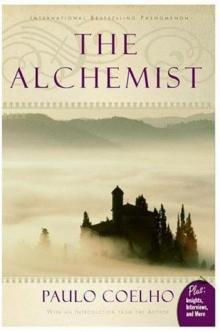 The Alchemist
The Alchemist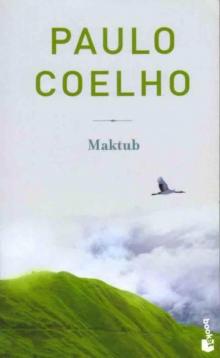 Maktub
Maktub Like the Flowing River
Like the Flowing River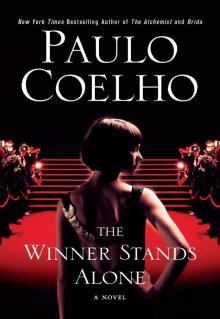 The Winner Stands Alone
The Winner Stands Alone The Spy
The Spy By the River Piedra I Sat Down and Wept: A Novel of Forgiveness
By the River Piedra I Sat Down and Wept: A Novel of Forgiveness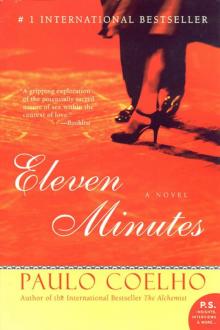 Eleven Minutes
Eleven Minutes Manuscript Found in Accra
Manuscript Found in Accra Warrior of the Light
Warrior of the Light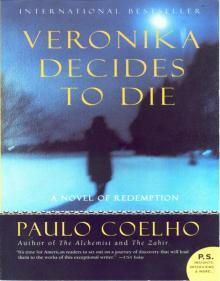 Veronika Decides to Die: A Novel of Redemption
Veronika Decides to Die: A Novel of Redemption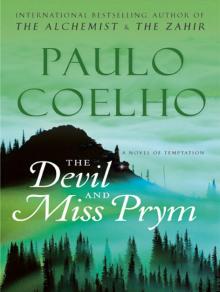 The Devil and Miss Prym: A Novel of Temptation
The Devil and Miss Prym: A Novel of Temptation The Valkyries: An Encounter With Angels
The Valkyries: An Encounter With Angels Brida: A Novel
Brida: A Novel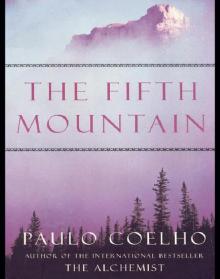 Fifth Mountain: A Novel
Fifth Mountain: A Novel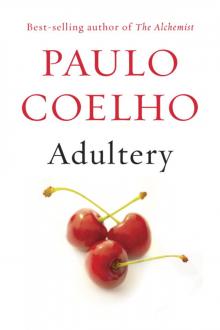 Adultery
Adultery Inspirations
Inspirations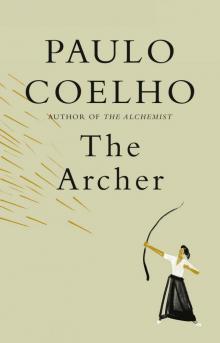 The Archer
The Archer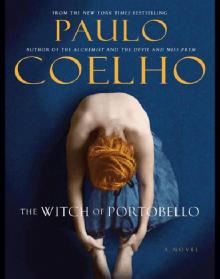 The Witch of Portobello
The Witch of Portobello The Pilgrimage
The Pilgrimage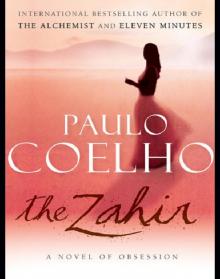 The Zahir
The Zahir Brida
Brida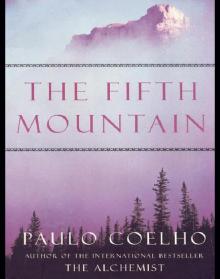 The Fifth Mountain
The Fifth Mountain Like the Flowing River: Thoughts and Reflections
Like the Flowing River: Thoughts and Reflections Manual of the Warrior of Light
Manual of the Warrior of Light By The River Piedra I Sat Down & Wept
By The River Piedra I Sat Down & Wept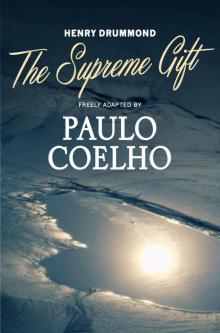 The Supreme Gift
The Supreme Gift Aleph
Aleph Hippie
Hippie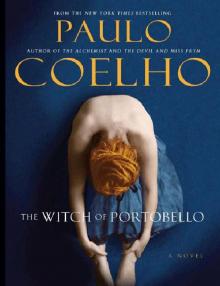 Witch of Portobello
Witch of Portobello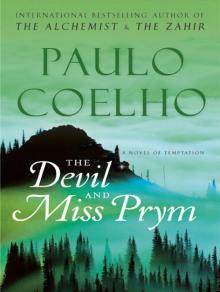 The Devil and Miss Prym
The Devil and Miss Prym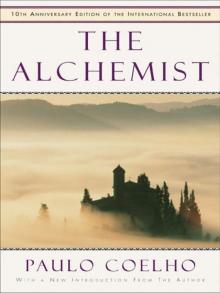 The Alchemist - 10th Anniversary Edition
The Alchemist - 10th Anniversary Edition The Valkyries
The Valkyries